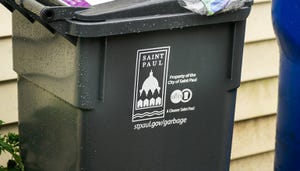Army, North Carolina County Team Up to Help Developing Nations with Solid Waste Management
The U.S. Army has teamed with a North Carolina county to help developing countries improve their solid waste management operations.
The Army’s 98th Civil Affairs Battalion (Airborne) Echo and Fox companies worked with the Union County Public Works (UCPW) operations to help prepare eight Civil Affairs Teams (CATs) for a coming deployment, according to a news release. The teams will work with foreign governments, security forces and populations to assess and help address key needs, such as basic infrastructure.
UCPW has a multifaceted solid waste management facility, so the Army asked the county to share logistics, environmental impact and challenges of solid waste management with the CATs prior to their deployment. The CATs aim to improve national stability by better connecting foreign populations with their legitimate governments.
“This training is extremely useful for our teams that are preparing to do their missions overseas,” said Major Kyle Goodridge. “It helps them understand how these kinds of facilities operate, how to interact with local officials and understand the impact that this kind of facility has on the population and how to effectively run an operation like this not only for the benefit of the county, but for the population it services as well.”
The UCPW hosted eight groups at the 174-acre solid waste management facility. Each group received a tour of the facility, with presentations on municipal solid waste (MSW) disposal, construction and demolition (C&D) debris, yard waste and other recyclables.
“Working with the Army on this project has been extremely rewarding,” said Ron Gilkerson, director of solid waste for the county and host for the sessions, along with Chris Medlin, landfill operations superintendent. “Everyone in Union County Public Works is very appreciative of their service and what they’re doing to help other nations. We’re proud to be a part of this effort and look forward to seeing the results of their hard work.”
The military and waste management certainly have teamed up before. When the Ebola epidemic hit West Africa, hazardous waste specialist Richard Dabal of the U.S. Army Corps of Engineers was one of the U.S. officials there to help with the $750 million aid plan that included dispatching 3,000 U.S. troops.
As part of that U.S. government effort, Dabal and a team of 13 coworkers were tasked with scouting the entire country, which is slightly larger than Tennessee, via helicopters to find sites to construct emergency medical centers to treat Liberians with the deadly virus. Liberia was the ground zero of Ebola, with at least 4,117 recorded deaths, according to the World Health Organization.
Another union of the military and waste management came when Justen Garrity returned from serving in Iraq in 2009, and with the economy suffering, he started a firm to create jobs involving the collection of food scraps–a company he called Veteran Compost.
Last December a relatively small dispute was resolved between the U.S. Environmental Protection Agency (EPA) and the Army. The two reached a $59,220 settlement for the Army’s alleged violations of its hazardous waste permit at Fort Wainwright, Alaska, in contravention of the Resource Conservation and Recovery Act (RCRA).
The Army facility is covered under a RCRA permit, which requires the Army to notify EPA of any new or newly discovered solid waste management units. EPA alleges that the Army violated its RCRA permit by failing to notify the agency when an old munitions and explosives dump was discovered within the Fort’s Small Arms Range Complex in June 2013.
About the Author(s)
You May Also Like


